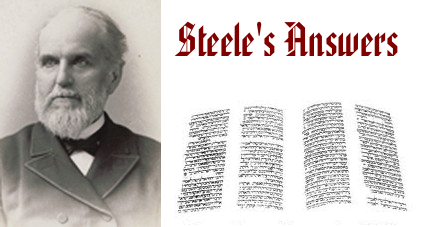Having chosen the higher path, do not be discouraged by the obstacles in the way of your entering and walking therein. You are not to remove them by your own strength. You have an almighty and complete Saviour, "able to save unto the uttermost all who come unto God by him." With a submissive will and believing soul, "pray that you may know the exceeding greatness of his power to us-ward who believe." Pray, and faint not. Take into your closet Charles Wesley's great dramatic lyric of a struggling and victorious soul, "Wrestling Jacob," and pray its words till the intensity of the expressions kindle your soul with earnestness and unconquerable persistence.
COME, O Thou Traveller unknown,
Whom still I hold, but cannot see,
My company before is gone,
And I am left alone with Thee.
With Thee all night I mean to stay,
And wrestle till the break of day.
I need not tell Thee who I am,
My misery, or sin declare,
Thyself hast call'd me by my name,
Look on thy hands, and read it there,
But who, I ask Thee, who art Thou?
Tell me thy name, and tell me now.
In vain Thou strugglest to get free,
I never will unloose my hold:
Art Thou the Man that died for me?
The secret of thy love unfold;
Wrestling I will not let Thee go,
Till I thy name, thy nature know.
'Tis all in vain to hold thy tongue,
Or touch the hollow of my thigh:
Though every sinew be unstrung,
Out of my arms Thou shalt not fly;
Wrestling I will not let Thee go,
Till I thy name, thy nature know.
My strength is gone, my nature dies,
I sink beneath thy weighty hand,
Faint to revive, and fall to rise;
I fall, and yet by faith I stand,
I stand, and will not let Thee go,
Till I thy name, thy nature know.
Yield to me now--for I am weak;
But confident in self-despair:
Speak to my heart, in blessings speak,
Be conquer'd by my instant prayer,
Speak, or Thou never hence shalt move,
And tell me, if thy name is LOVE.
'Tis Love, 'tis Love! Thou diedst for me,
I hear thy whisper in my heart.
The morning breaks, the shadows flee:
Pure UNIVERSAL LOVE Thou art,
To me, to all, thy bowels move,
Thy nature, and thy name is LOVE.
Contented now upon my thigh
I halt, till life's short journey end;
All helplessness, all weakness I,
On Thee alone for strength depend,
Nor have I power, from Thee, to move;
Thy nature, and thy name is LOVE.
Lame as I am, I take the prey,
Hell, earth, and sin with ease o'ercome;
I leap for joy, pursue my way,
And as a bounding hart fly home,
Thro' all eternity to prove
Thy nature, and thy name is LOVE.
— Charles Wesley (1707-1788)
Let your faith grasp some one of Christ's many precious promises, and
use it as a key. Then will the iron gate across the king's highway swing
back upon its hinges, and the path never trod by the lion's whelps
shall lie before you.
